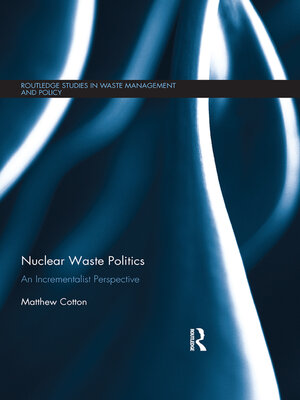Nuclear Waste Politics
ebook ∣ An Incrementalist Perspective · Routledge Studies in Waste Management and Policy
By Matthew Cotton

Sign up to save your library
With an OverDrive account, you can save your favorite libraries for at-a-glance information about availability. Find out more about OverDrive accounts.
Find this title in Libby, the library reading app by OverDrive.



Search for a digital library with this title
Title found at these libraries:
| Library Name | Distance |
|---|---|
| Loading... |
The question of what to do with radioactive waste has dogged political administrations of nuclear-powered electricity-producing nations since the inception of the technology in the 1950s. As the issue rises to the forefront of current energy and environmental policy debates, a critical policy analysis of radioactive waste management in the UK provides important insights for the future.
Nuclear Waste Politics sets out a detailed historical and social scientific analysis of radioactive waste management and disposal in the UK from the 1950s up to the present day; drawing international comparisons with Sweden, Finland, Canada and the US. A theoretical framework is presented for analysing nuclear politics: blending literatures on technology policy, environmental ethics and the geography and politics of scale. The book proffers a new theory of "ethical incrementalism" and practical policy suggestions to facilitate a fair and efficient siting process for radioactive waste management facilities. The book argues that a move away from centralised, high capital investment national siting towards a regional approach using deep borehole disposal, could resolve many of the problems that the high stakes, inflexible "megaproject" approach has caused across the world.
This book is an important resource for academics and researchers in the areas of environmental management, energy policy, and science and technology studies.







